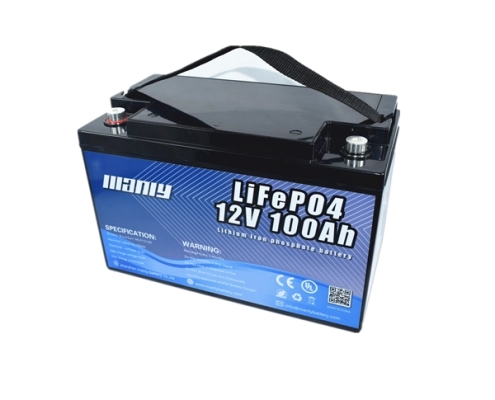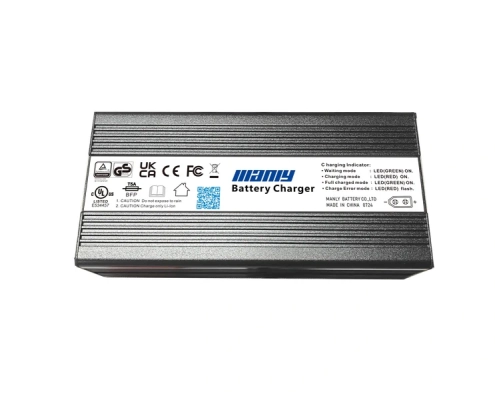What Is The Difference Between Industrial Batteries And Regular
Table of Contents
- What Is The Difference Between Industrial Batteries And Regular
Choosing the right battery is essential for maximizing performance, efficiency, and cost-effectiveness. Industrial batteries and a regular battery serve different purposes, with the former designed for heavy-duty applications and the latter optimized for everyday consumer use. Understanding the distinctions between these options—particularly in terms of durability, maintenance, and lifespan—can help you make informed decisions that align with your energy needs. Whether you’re considering industrial lithium batteries for high-demand tasks or seeking a practical battery replacement for smaller devices, knowing the strengths and limitations of each type is critical.
What Are Industrial Batteries?
Definition and Characteristics
Industrial batteries are specifically engineered to power heavy-duty applications, offering exceptional durability, energy capacity, and performance under demanding conditions. Unlike a regular battery, which is designed for lightweight or consumer uses, industrial batteries are built to handle extreme environments, high energy demands, and extended usage cycles.
Key Features:
- High Durability: Designed to withstand mechanical stress, temperature extremes, and frequent cycling.
- Customizable Designs: Tailored for specific industrial uses, such as forklift battery systems or renewable energy storage.
- Extended Lifespan: Many industrial batteries last significantly longer than their consumer counterparts, with some enduring up to 20 years.
- Energy Density: Advanced technologies, such as industrial lithium batteries, provide superior energy storage and output efficiency.
Common Types:
- Industrial Lithium Batteries: Known for high energy density, lightweight design, and minimal maintenance. Often preferred for forklifts, robotics, and renewable energy systems.
- Lead-Acid Batteries: Economical and reliable, widely used in forklifts and backup power systems.
- Nickel-Cadmium (NiCd) Batteries: Durable and capable of operating in extreme temperatures, though their usage is declining due to environmental concerns.
- Nickel-Metal Hydride (NiMH) Batteries: A safer and more environmentally friendly option for medical devices and industrial sensors.
What Are Industrial Batteries Used For?
Industrial batteries are essential for powering a wide range of heavy-duty and mission-critical applications, ensuring consistent energy delivery and operational efficiency.
Applications:
- Heavy Machinery: Used in mining, construction, and large-scale manufacturing to power high-demand equipment.
- Renewable Energy Storage: Critical for solar and wind energy systems, industrial batteries store energy efficiently for use during off-peak periods.
- Forklifts and Warehouse Equipment: Forklift batteries, typically lead-acid or lithium-ion, provide consistent power to keep operations running smoothly.
- Transportation and Logistics: Power electric trains, ships, and other industrial vehicles.
- Backup Power Systems: Serve as reliable energy sources for data centers, hospitals, and emergency systems.
Importance of Industrial Batteries:
- Reliability: Their robust construction ensures uninterrupted performance, even in harsh conditions.
- Efficiency: Modern technologies, such as industrial lithium batteries, minimize energy losses and enhance operational productivity.
- Longevity: Reduces replacement frequency, leading to cost savings and sustainability.
What Are Regular Batteries?
Definition and Characteristics
A regular battery is designed for everyday use in household devices such as remote controls, flashlights, toys, and portable electronics. These batteries are typically smaller and less robust than industrial batteries, making them ideal for applications that require convenience and affordability over heavy-duty performance.
Key Features:
- Variety of Sizes: Available in standard formats like AA, AAA, C, D, and 9V to suit different devices.
- Affordability: Economical for mass consumer use, especially in disposable variants like alkaline or zinc-carbon batteries.
- Convenience: Ready-to-use and widely available in retail stores.
- Limited Lifespan: Designed for moderate usage and often discarded after depletion, though rechargeable versions offer extended usability.
Common Types of Regular Batteries:
- Alkaline Batteries: Widely used, long-lasting, and affordable; perfect for toys, remote controls, and flashlights.
- Zinc-Carbon Batteries: An older technology, less durable than alkaline but still used for low-power devices.
- Lithium Batteries: Lightweight and high-performing, suitable for cameras, watches, and other devices requiring stable, long-term power.
- Rechargeable Batteries: Available in nickel-metal hydride (NiMH), nickel-cadmium (NiCd), and lithium-ion (Li-ion) chemistries. These offer an eco-friendly alternative to disposable batteries.
- Button Cells: Compact and durable, ideal for watches, calculators, and hearing aids.
Everyday Applications of Regular Batteries
Regular batteries power most household devices and are indispensable for ensuring convenience and functionality in daily life.
Common Uses:
- Household Devices: Remote controls, wall clocks, and smoke detectors.
- Portable Electronics: Cameras, flashlights, and handheld gaming consoles.
- Toys: Battery-operated toys and gadgets for children.
- Wearable Technology: Watches, fitness trackers, and hearing aids.
Why Regular Batteries Are Popular:
- Accessibility: Found in nearly every supermarket or convenience store.
- Affordability: A cost-effective solution for most consumer needs.
- Ease of Use: Require no specialized knowledge for installation or maintenance.
While regular batteries lack the heavy-duty capabilities of industrial batteries, their versatility and affordability make them an essential part of everyday life. For applications that demand higher energy outputs or longer lifespans, industrial lithium batteries and other heavy-duty alternatives may be more suitable.
Can You Use Industrial Batteries in Anything?
You cannot use industrial batteries in just any device due to differences in size, voltage, and chemistry. These batteries are designed for heavy-duty applications and may cause damage or pose safety risks if used inappropriately. However, there are rare cases where specific modifications or requirements make it possible.
Safety and Compatibility
Industrial batteries are not interchangeable with a regular battery because they are built for specific purposes, with unique characteristics that make them unsuitable for most consumer devices.
Why Industrial Batteries Are Not Compatible:
- Voltage and Power Output: Industrial batteries typically operate at much higher voltages than regular batteries, which could damage household electronics.
- Size and Shape: Industrial batteries are often larger and heavier, designed for high-capacity use, while consumer devices typically require standardized sizes like AA or AAA. Additionally, industrial batteries often have unique terminal configurations, making them physically incompatible with most consumer electronics.
- Chemical Composition: The advanced chemistries in industrial lithium batteries may be incompatible with the circuitry of smaller devices.
- Safety Concerns: Using an industrial battery in an unapproved device could lead to overheating, leakage, or fire hazards.
- Cost Considerations: Industrial batteries are designed with high-grade materials and advanced technologies to meet rigorous performance standards, making them significantly more expensive than a regular battery. Using these batteries in devices that do not require such high specifications can unnecessarily increase production costs without adding proportional value.
Practical Considerations:
- Custom Design: Some industrial batteries are custom-made for specific machines or systems, further limiting their adaptability.
- Lack of Standardized Ports: Connections and terminals on industrial batteries rarely match consumer-grade devices, preventing direct use.
When It Is Possible
In certain scenarios, industrial batteries may be used in unconventional ways, but this often requires professional modifications and precautions.
Situations Where It Might Work:
- DIY Projects: Hobbyists may use industrial lithium batteries in high-powered tools or gadgets, but only with appropriate knowledge and safety measures.
- Specialized Equipment: Some industrial batteries can replace a regular battery in advanced machinery or custom-built systems designed to handle higher power outputs.
- Battery Replacement in Niche Devices: For high-demand systems like electric bikes or drones, industrial batteries might offer superior performance if adapted correctly.
Risks and Precautions:
- Circuit Modification: Without modifying the receiving device, mismatched voltage or chemistry could cause failure.
- Heat Management: Industrial batteries generate more heat during operation, necessitating advanced cooling mechanisms.
- Expert Supervision: Only professionals should attempt to adapt or retrofit industrial batteries for unintended uses.
While the adaptability of industrial batteries is limited, they excel in applications requiring durability and high energy output. For most consumer devices, sticking with a regular battery ensures optimal performance and safety.
Are Industrial Batteries Better?
Industrial batteries are designed for specialized applications, offering advantages in durability, performance, and longevity. However, their suitability depends on the specific use case. While industrial batteries often outperform regular battery options in heavy-duty scenarios, there are situations where regular batteries are more practical due to cost and convenience.
Performance and Longevity
Industrial batteries excel in performance and longevity compared to regular battery alternatives. These batteries are engineered for sustained output, high energy capacity, and durability in demanding environments.
- Performance: Industrial batteries, particularly industrial lithium batteries, deliver consistent power over extended periods. This is crucial in industries like manufacturing or logistics, where equipment downtime must be minimized. In contrast, regular batteries are ideal for short-term, low-power applications like household electronics.
- Longevity: Industrial batteries are built to last, with some models providing thousands of charge cycles. For example, industrial lithium batteries often exceed 3,000 cycles, significantly outlasting regular batteries, which may only support a few hundred cycles. This makes industrial batteries a more cost-effective solution in the long term, despite their higher upfront costs.
Suitability for Heavy-Duty Tasks
Heavy-duty tasks demand robust power sources, making industrial batteries a superior choice. These batteries are specifically designed to handle high power loads and prolonged usage.
- High Energy Demands: Industrial applications like forklifts, renewable energy systems, and large-scale machinery rely on the consistent output of industrial batteries. Their ability to maintain performance under heavy loads ensures reliability in critical operations.
- Durability: The rugged construction of industrial batteries protects them from environmental factors such as extreme temperatures, vibrations, and shocks, making them indispensable in challenging environments. Regular batteries lack these protective features, limiting their usability in such scenarios.
Limitations
While industrial batteries offer notable advantages, there are scenarios where a regular battery might be more practical:
- Cost Sensitivity: Industrial batteries typically come with a higher price tag, making them less suitable for budget-conscious applications like consumer electronics or toys.
- Portability and Size: Regular batteries are compact, lightweight, and easy to replace, making them ideal for portable devices. Industrial batteries are often heavier and larger, limiting their practicality in small-scale applications.
- Simple Use Cases: For devices with low energy demands or infrequent use, such as remote controls or clocks, regular batteries are more cost-effective and convenient.
Do Industrial Batteries Last Longer?
Yes, industrial batteries generally last longer than a regular battery due to their advanced design, robust construction, and higher recharge cycle capacity. However, their longevity depends on factors like usage patterns, maintenance, and the specific type of battery technology employed.
Lifespan Comparison
Industrial batteries are specifically engineered for longevity, offering significantly more recharge cycles compared to a regular battery. This is a key factor in their widespread use in industries that demand reliable, long-term power.
- Recharge Cycles: On average, industrial lithium batteries can deliver over 3,000 to 5,000 recharge cycles. In contrast, most regular batteries, such as alkaline or consumer-grade lithium-ion, typically offer fewer than 500 cycles. This makes industrial batteries an ideal choice for applications requiring sustained power over time, such as renewable energy systems or heavy machinery.
- Durability: Industrial batteries are built with high-quality materials designed to withstand harsh conditions like extreme temperatures and continuous discharge. For example, industrial lithium batteries maintain efficiency even in high-demand scenarios, whereas regular batteries may degrade quickly when exposed to similar conditions.
- Overall Lifespan: Due to their higher recharge cycle count and superior durability, industrial batteries can last for 5–10 years or more, depending on the application. In comparison, regular batteries may need battery replacement within a year or two of frequent use.
Factors Affecting Lifespan
The lifespan of both industrial batteries and regular battery options is influenced by multiple factors, including how they are used, maintained, and designed.
- Usage Patterns: High-drain applications, such as forklifts or renewable energy storage, demand more from a battery. Industrial lithium batteries are designed to handle these conditions without significant performance loss, while regular batteries are better suited for intermittent, low-energy tasks.
- Maintenance: Proper maintenance significantly extends a battery’s lifespan. Industrial batteries often require regular checks and balanced charging systems to avoid overcharging or deep discharge. In contrast, regular batteries are typically maintenance-free but have shorter lifespans due to their simplified design.
- Design and Technology: The advanced internal structures of industrial batteries, including high-quality separators and optimized electrode materials, contribute to their extended lifespan. Regular batteries, while simpler and cheaper, lack these features and degrade more quickly under heavy use.
Lithium vs. Regular Batteries
Lithium batteries differ significantly from regular ones in terms of materials, technology, and applications. These differences make lithium batteries, including industrial lithium batteries, more suitable for demanding tasks, while regular batteries are better suited for everyday consumer use.
Material and Technology Differences
The material composition and technology used in industrial lithium batteries and regular battery options are critical factors influencing their performance, durability, and usability.
- Composition:
- Industrial lithium batteries use advanced lithium-ion technology, which provides high energy density and extended lifespans. They can handle demanding industrial applications, such as powering heavy machinery or renewable energy systems.
- Regular batteries, including alkaline and standard lithium-ion batteries, often have simpler compositions. These are tailored for consumer electronics like remote controls, toys, and portable devices.
- Capacity:
- Lithium batteries, especially industrial-grade ones, offer significantly higher capacities. For instance, an industrial lithium battery may have a capacity of up to 3000mAh, suitable for long-term energy storage or high-power equipment. In contrast, regular batteries, with capacities around 500-1000mAh, are designed for intermittent and low-energy applications.
- Durability:
- Industrial batteries are built to withstand extreme conditions, including temperatures from -20°C to 60°C. This makes them ideal for challenging environments like construction sites or manufacturing facilities. Regular batteries are less durable, typically operating within a narrower temperature range of -20°C to 50°C, limiting their use in harsh environments.
Pros and Cons
Understanding the advantages and limitations of industrial lithium batteries versus regular batteries can help in selecting the right option for specific needs.
Advantages of Industrial Lithium Batteries:
- High Energy Density: Provides more power in a compact form, enabling longer runtimes.
- Extended Lifespan: With up to 500 charge cycles, these batteries reduce the need for frequent battery replacement, saving long-term costs.
- Durability: Resistant to shocks, vibrations, and extreme temperatures, ensuring reliability in industrial environments.
- High Capacity: Offers sustained energy for heavy-duty applications like forklifts, UPS systems, or drones.
Advantages of Regular Batteries:
- Low Initial Cost: Affordable and widely available for everyday devices.
- Ease of Replacement: Readily accessible and easy to replace in household applications.
- Lightweight and Compact: Ideal for portable devices and small electronics.
Disadvantages of Industrial Lithium Batteries:
- Higher Upfront Cost: The advanced technology and durability come at a premium.
- Specialized Applications: Not suitable for small-scale or low-power devices due to their size and capacity.
Disadvantages of Regular Batteries:
- Shorter Lifespan: Requires more frequent replacements due to limited recharge cycles (200-300 cycles on average).
- Limited Performance: Less capable of handling high energy demands or extreme environmental conditions.
Cost and Maintenance
The cost and maintenance of batteries vary significantly between industrial batteries and a regular battery, depending on their intended applications and design. While industrial batteries have higher upfront costs, they often prove more cost-effective in the long run due to their durability and extended lifespan.
Cost Analysis
When comparing costs, it’s essential to consider both the initial investment and the long-term financial implications of industrial batteries and regular battery options.
- Initial Cost:
- Industrial batteries, particularly industrial lithium batteries, have a higher upfront cost. This is due to their advanced materials, larger capacity, and durability. For example, a 12V industrial lithium battery can cost significantly more than a regular lead-acid battery or consumer-grade lithium-ion battery.
- In contrast, a regular battery is more affordable, making it a practical choice for small-scale or one-time applications. These are commonly used in household devices like remotes or toys, where cost efficiency is critical.
- Long-Term Costs:
- Although industrial batteries require a larger initial investment, their extended lifespan (500+ cycles compared to 200-300 cycles for a regular battery) reduces the frequency of battery replacement, leading to lower long-term costs.
- Regular batteries, while cheaper upfront, may incur higher overall costs due to frequent replacements, especially in devices with consistent energy demands.
Maintenance Requirements
The maintenance needs of batteries also differ significantly, with industrial batteries generally requiring more attention but offering benefits in return.
- Maintenance for Industrial Batteries:
- Regular inspections are necessary to ensure optimal performance and extend the lifespan of industrial batteries. Tasks include checking for corrosion, balancing charge levels, and ensuring proper storage conditions.
- Industrial lithium batteries are relatively low-maintenance compared to other types of industrial batteries, such as lead-acid. They do not require water refilling or as much monitoring, which lowers maintenance costs. However, they still benefit from periodic checks and the use of specialized chargers to avoid deep discharge.
- Maintenance for Regular Batteries:
- Most regular batteries are designed for convenience and minimal maintenance. Single-use options, like alkaline batteries, are disposable and require no upkeep beyond replacement. Rechargeable regular batteries, such as NiMH or small lithium-ion cells, need occasional recharging but generally demand less maintenance compared to their industrial counterparts.
- However, their simpler design and lower durability mean they are more prone to early wear, leading to quicker battery replacement cycles.
Conclusion
When deciding between industrial batteries and a regular battery, it’s essential to consider your specific requirements and priorities. Industrial lithium batteries offer superior longevity, durability, and capacity, making them ideal for demanding environments, but they come at a higher upfront cost. On the other hand, regular batteries provide convenience and affordability for everyday tasks but may require more frequent battery replacement in high-usage scenarios. By evaluating factors such as cost, maintenance, and application needs, you can choose the best battery solution to optimize both performance and long-term value.
FAQ
1. What is industrial battery?
A: Industrial batteries are designed to provide reliable power in demanding environments, such as manufacturing facilities, warehouses, and construction sites. They are built to withstand heavy use, vibrations, and extreme temperatures, ensuring consistent performance in critical applications.
2. What industries use lithium batteries?
A: Lithium batteries are utilized across various industries due to their high energy density and efficiency. They are commonly found in:
- Automotive Industry: Powering electric vehicles and hybrid cars.
- Consumer Electronics: Used in smartphones, laptops, and tablets.
- Industrial Sector: Supporting equipment like robotics, warehouse automation systems, and portable power tools.
3. Can you recharge regular batteries?
A: Regular alkaline batteries are not designed to be recharged. Attempting to recharge them can lead to leakage, rupture, or even explosion, posing safety risks. It’s essential to use batteries specifically labeled as “rechargeable,” such as Nickel-Metal Hydride (NiMH) or lithium-ion batteries, which are engineered for safe recharging.









